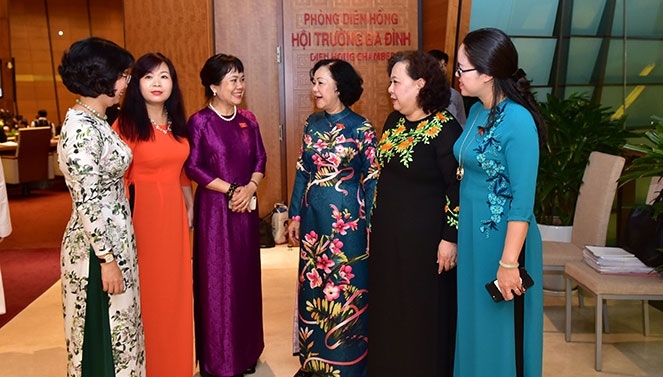Immediately after gaining independence on September 2, 1945, Vietnam held a general election to elect the first National Assembly. The Decree 14 on the general election issued on September 8, 1945, clearly stated that, “All Vietnamese citizens from 18 years of age and older, regardless of their gender, have the right to cast their ballots and stand as candidates.”
This represents a progressive standpoint of Vietnam compared to many other countries around the world, especially because at that time the concept of equality between men and women was a new issue. To popularise this view, President Ho Chi Minh produced many articles and talks about women and women’s rights. The general election was successful, with the first 10 female candidates being elected to the first legislature.
Assoc. Prof., Dr. Nguyen Trong Phuc of the Ho Chi Minh National Academy of Politics recalled that even in the United States, though the first congress was elected in 1791, it took a long time before women had the right stand as candidates. In contrast, it was done in Vietnam in the first general election, whilst the women-to-men ratio in the Vietnamese legislative body has since improved up to present.
From the earliest years, through each tenure, female National Assembly deputies have always demonstrated their bravery, wisdom, and dedication, showing they are worthy of being outstanding women and representatives of the people. The quantity and quality of female representatives is also increasingly improving. From having only 10 female deputies in the first National Assembly, the number of such deputies has now climbed to 151, accounting for 30.26% of the total number of deputies to the current 15th legislature.
In addition, qualifications, expertise, and operational experience of female deputies has also continuously improved. The number of female deputies who speak at the legislature remains high, with their opinions highly appreciated. This helps to change the community’s thinking and perception of women’s ability to engage in the policymaking process and deciding on important issues in the country.
Most notably, for the first time in history Vietnam elected its first National Assembly chairwoman in the 2016 - 2021 tenure. During that time, three women were also elected to the Political Bureau of the Communist Party of Vietnam. During the current 2021 - 2026 tenure, the country had its the first female permanent secretary of the Party’s Secretariat and nine female secretaries of the provincial Party Committees.
“In fact, female officials have strived to work and study hard to meet assigned development tasks. They are also willing to go anywhere, do anything and also fulfill the tasks well. Through those challenges, they deserve to be promoted to higher roles,” said Do Thi Lan, deputy head of the NA’s Social Affairs Committee.

Vietnamese women’s important contributions testify to the superiority of the Party and State in the cause of women’s and human liberation, thereby helping to elevate their role and position in society. However, regulations on the proportion of women engaging in Party building and state government in many localities are not guaranteed. Even in some localities, there are no women holding the positions of secretary or deputy secretary, while gender equality in ethnic minority areas is yet to receive due attention.
“We must continue to perfect the legal policy framework on gender equality in general and gender equality in the political field in particular. In addition, we must also raise public awareness of gender equality in society, in the family and at the workplace, along with solutions to enhance women empowerment and capacity,” recommended Dr. Luong Thu Hien, director of the Center for Gender Research and Women’s Leadership of the Ho Chi Minh National Academy of Politics.
Striving for equal rights between men and women is a consistent policy clearly prescribed in the 1946 Constitution. Equality is not only a goal to ensure the women-to-men ratio in the leadership apparatus, but also to promote women’s potential and empowerment within society.





